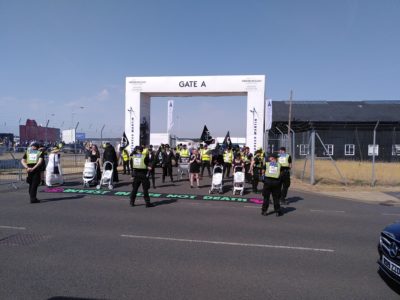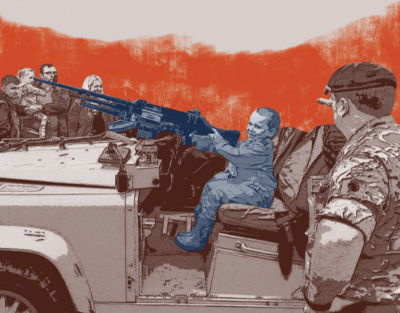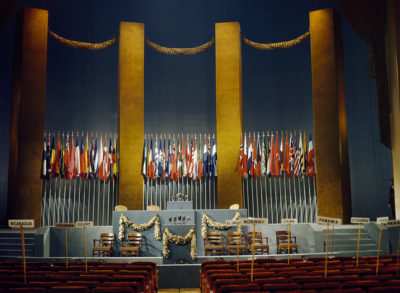Pioneering a dystopian future

It is the season of airshows, back on full power after two years of pandemic cancellations. The Royal International Air Tattoo (RIAT) finished at the weekend and the Farnborough International Airshow is running from Monday to Friday this week.
For those concerned about the environmental affects of aviation the airshows provide little consolation. While sustainability and low emission air travel are touted as key themes of the events, climate change experts and Parliament’s own Climate Change Committee are casting doubt on the government’s ‘jet zero’ policy on the future of aviation, launched this week. They warn that the technologies this relies on will not be commercially available until 2050 and a strategy to cut down on flights is needed. ‘Pioneer the Future’ looks great on the Farnborough publicity but perhaps at this stage it amounts to little more than securing the workforce and contracts to keep the defence and aerospace sector going.
ForcesWatch take in interest in airshows because of the predictably heavy involvement of military and defence interests but primarily because they are important sites for defence engagement with the public. Many are community-led events where the top spectacles are the RAF Red Arrows, Typhoon or Falcon display teams. Others, such as Wales Airshow and Southport also have a significant military presence on the ground, with hardware and military-themed activities and demonstrations. Like Armed Forces Day events which took place in late June in around 150 communities around the UK, airshows often include recruitment stalls and activities.
RIAT and Farnborough are first and foremost trade shows – providing opportunities for defence, aerospace and aviation companies and state militaries from across the globe to network and do business, and some politics. Farnborough, RIAT and the RAF Cosford Airshow, which took place in June, are each sponsored by many of the world’s largest defence companies and the UK military. The showcasing is aimed both at the business market and a domestic audience happy to enthuse over military spectaculars in a conflict-free environment. So RIAT is both ‘an outstanding place to do business’ and described as ‘a three-day-long extravaganza of flying displays, static exhibits, and interactive family entertainment’. There are signs that Farnborough is focusing more on its core interests; in 2020 the organisers stated that the weekend public airshow that followed the trade fair was no longer commercially viable and a greater focus would be put ‘on engaging the next generation pilots, engineers and innovators by bringing STEM subjects to life through the industries and technology represented’.
Nurturing Generation Tempest
It is the next generation that provides the other key audience for the defence and corporate interests served by these massive airshows, through a STEM education and careers focus.
It is the next generation that provides the other key audience for the defence and corporate interests served by these massive airshows, through a STEM education and careers focus. School and youth groups and students up to university level are invited, as well as children and young people with their families. Around 6500 school students visit Farnborough and 7000 visit RIAT. Farnborough is described as an ‘exciting showcase of the very best in science, technology, engineering, arts and mathematics (STEAM)… designed to give students, apprentices, graduates and young professionals considering a career in aerospace unprecedented access to the industry’, and RIAT as a ‘leading showcase for Science, Technology, Engineering and Mathematics’.
The trade organisation ADS, which represents over 1100 companies in aerospace, defence and security industries, co-organise the STEM education activities at Farnborough on the final day of the trade fair. Previously called Farnborough Friday or Futures Day, it has been rebranded for 2022 as ‘Pioneers of Tomorrow’. The organisers have also added an ‘A’ for arts into STEM to create STEAM in a rather clumsy attempt to broaden appeal.
ADS state that, ‘with the help and support of our partners, sponsors, exhibitors and inspirational figures, we bring you a day of amazing hands-on activities, virtual reality experiences, careers workshops and so much more.’ Inspirational figures have included European Space Agency astronaut Tim Peake in 2018. Tom Cruise made a well-timed appearance at RIAT this year hot on the heals of the launch of Top Gun: Maverick, which the RAF have been keen to make an association with, and apparently discussed RAF career aspirations with cadets.
Some of the world’s large defence companies that sponsor the trade aspect of the airshow are also ‘helping to inspire the next generation of aerospace pioneers’ with sponsorship or provision of events for young people. As part of the ‘workforce‘ strand of events BAE Systems are hosting STEM activities and career insight talks and Airbus have an immersive zone. Boeing, Safran and the RAF are listed amongst the sponsors. Also promised are a careers hub, innovation showcase, STEAM trail, access to the trade exhibition and the displays. Farnborough will be hosting the international final of the 2022 Rocketry Challenge, sponsored by Lockheed Martin. Online resources include the Raytheon UK Resource Hub featuring a STEM activity book, thee company’s Quadcopter Challenge and information about its many STEM ambassadors available for school visits.
Other events are sponsored by organisations that represent the interests of defence companies and the military. These include ADS, organisers of the Pioneers of Tomorrow events, and the Royal Aeronautical Society, which has numerous partnerships with defence-related aerospace companies. Both organisations are involved in STEM education across a number of long-standing projects. The Aerospace Industries Association – a similar US organisation – is also listed as a sponsor. The Institute of Engineering and Technology is also a sponsor and is one of six UK professional organisations out of 20 surveyed by Scientists for Global Responsibility that were found to have significant links to the defence industry, including defence-sponsored STEM materials. Many also had similar links to the fossil fuel industry.
In 2018 the Farnborough Futures Day included a workshop based on MBDA’s Enforcer missile system, allowing students to handle and simulate firing the weapons.
In 2018 the Farnborough Futures Day included a workshop based on MBDA’s Enforcer missile system, allowing students to handle and simulate firing the weapons. It was presented as an activity for ‘all ages’ and, ‘an opportunity to manage a shoulder mounted, guidance system that allows the user to seek, aim and fire at military tanks and buildings in a gaming environment’.
The primary sponsor of RIAT is BAE Systems – the UK’s largest arms company – alongside the RAF Charitable Trust that runs the event. The Technozone is sponsored by Lockheed Martin, and activities range from those with a broad STEM association, to those focusing on engineering – the part of the STEM curriculum which is more dominated by defence interests – to those more explicitly about careers. A list of companies exhibiting in the Technozone in 2019 includes eight out of 20 of the worlds largest arms producers at that time. Activity providers included RAF’s own Youth STEM team, BAE Systems, and those of Team Tempest – a UK-based consortium of military and defence interests developing a new generation of fighter jets. A key player in the project, BAE have formulated the ‘Generation Tempest‘ narrative, ‘a bold vision for the future – a once-in-a-generation adventure to bring ground-breaking, game-changing technology to life’, in order to enlist the necessary workforce.
The bigger picture
80 companies with operations in the UK have supplied the war on Yemen by exporting military equipment to Saudi Arabia. These include many of those providing STEM and career activities to school students and young people.
An analysis by Campaign Against Arms Trade in 2020 found that 80 companies with operations in the UK have supplied the war on Yemen by exporting military equipment to Saudi Arabia. These include many of those mentioned here as providing STEM and career activities to school students and young people in the UK; BAE Systems ‘is the lead contractor on the Al-Yamamah and Al-Salam deals, and has sold a vast array of equipment to Saudi Arabia, including the Eurofighter Typhoon and Tornado combat aircraft used in Yemen’. Weapons from MBDA and Raytheon are known to have been used in the war, and Lockheed Martin has also exported missiles to Saudi Arabia. Leonardo and two companies associated more with commercial and civilian aircraft, Rolls Royce and Boeing, have also received export licences for the country related to combat aircraft.
Nurturing a workforce prepared, in every sense, to work in the defence and security industries is the key driving force behind the embedding of companies and the armed forces within education.
Nurturing a workforce prepared, in every sense, to work in the defence and security industries is the key driving force behind the embedding of companies and the armed forces within education. Wider research that ForcesWatch is currently working on explores the development of defence employer involvement in STEM education. The morphing of STEM into STEAM with the inclusion of the arts, symbolises the lengths that defence interests will go to in order to try and make themselves relevant.
For defence employers, STEM activities at airshows is an important part of their wider involvement in education and youth provision. Not only do the shows provide contact with large number of potential recruits, but the mass of military hardware and tech on display far outshines anything on offer within a school. Furthermore, while many school resources provided by defence employers are shy of bringing combat into the picture, airshows provide a context where companies can display the nature of their business unabashed. Yet, call an event an ‘airshow’ and few but the most determined (see here and here) will call it out for what it is.
See more: military in schools/colleges, military in society, arms trade, climate change
Like what you read?
> Sign up for our newsletter or blog notifications
> Support our work – from just £2 a month










